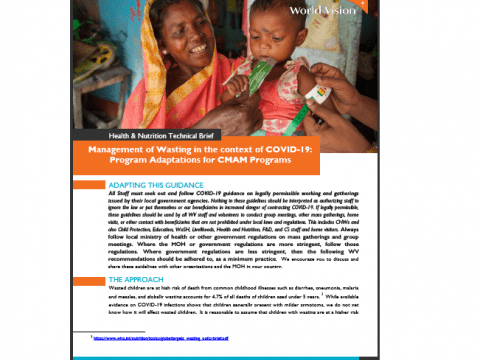WV Programmatic Adaptations to CMAM during COVID-19
Download
Management of Wasting in the context of COVID-19: Program Adaptations for CMAM Programs
Wasted children are at high risk of death from common childhood illnesses such as diarrhea, pneumonia, malaria and measles, and globally wasting accounts for 4.7% of all deaths of children aged under 5 years. [1] While available evidence on COVID-19 infections shows that children generally present with milder symptoms, we do not yet know how it will affect wasted children. It is reasonable to assume that children with wasting are at a higher risk of COVID-19 related pneumonia,[2] and that nutrition service provision may be interrupted during COVID-19 outbreaks.[3] In addition, with the number of people experiencing acute hunger expected to double due to the COVID-19 pandemic, it is anticipated that there will be an increase in the number of children requiring treatment for wasting.[4]
World Vision’s priorities for the management of wasting in the context of COVID-19 are three-fold:
- Intensify efforts to prevent child wasting including measures to protect, promote and support breastfeeding (including among infected mothers), to promote nutritious complementary foods and adequate complementary feeding practices (including responsive and active feeding during illness), and continued utilization of primary health care.
- Sustain and adapt existing services for the early detection and treatment of child wasting to respond to anticipated increases in the prevalence of child wasting, and to ensure continuity of the provision of critical services for the early detection and treatment of child wasting while reducing the risk of infection among service providers and between service providers and children, and planning for alternative options if and when delivery platforms become disrupted or non-functional (e.g. during lock-downs).
- Pre-positioning of essential nutrition commodities (e.g. F100/75, RUTF), where possible, to anticipate pipeline disruptions due to mobility restrictions.
This guidance describes programmatic adaptations that should be considered for CMAM programming. Where there are no mobility restrictions in place, preparatory measures for child wasting programming should be considered. Additional measures should be considered when partial or full mobility restrictions are in place.
For more information on this document contact health@wvi.org
[1] https://www.who.int/nutrition/topics/globaltargets_wasting_policybrief.pdf
[2] https://www.nutritioncluster.net/sites/default/files/2020-04/Joint%20statement%20on%20COVID%2019%20and%20Wasting.pdf
[3] https://reliefweb.int/report/yemen/covid-19-aftershocks-secondary-impacts-threaten-more-childrens-lives-disease-itself
[4] https://insight.wfp.org/covid-19-will-almost-double-people-in-acute-hunger-by-end-of-2020-59df0c4a8072
[5] Adapted from UNICEF/GTAM/GNC brief ‘Management of child wasting in the context of COVID-19’ available here



